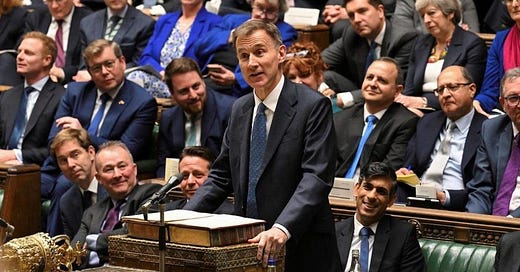An autumn statement of faith
How Christians vote doesn't matter, writes George Pitcher - it's how we think before we vote
The Church, in its recent history, has shied away from party-political affiliation. Its reticence in this regard is partly to do with a get-out clause that Christian doctrine transcends the profane polity, that our jurisdiction – in scriptural language, the kingdom of heaven – is not of this world. And partly, and more pragmatically, it’s so that it can open its doors to welcome everyone across the political spectrum, from proto-fascists to neo-Marxists.
The Christian vote in the UK is nowhere near as influential as in the US, where the Christian Right, both in its evangelical and Catholic versions, holds a firm grip on the Republican Party. But the Church of England is established in our legislature, with 26 bishops in the House of Lords, and consequently our political responsibility is inescapable. It follows that it’s spiritually indolent to shirk it.
Sop to hardline voters
That thought arises from this week’s Autumn Statement from our beleaguered government, which was pretty indistinguishable from a full-blown Budget. It cut business taxes, allegedly to spur economic growth but widely interpreted as a sop thrown to its hardline voter base ahead of a general election.
It was generous for pensioners, possibly for the same reason, and to those on the National Living Wage. And it froze duty on alcohol, making it slightly more affordable to remain inebriated through a 2024 that the Office of Budget Responsibility predicts is going to be truly economically awful.
What is the Christian voter to make of this? It’s no part of this column to advise confessing Christians how to vote in a forthcoming general election, probably slated for next year. That’s partly to do with the reasons stated at the top of this, but mostly because the two main UK political parties have become largely indistinguishable, like a grotesque mash-up of the climax of Orwell’s Animal Farm and Nicolas Cage in Face/Off.
Labour leader Sir Keir Starmer has spent the past couple of months parroting the government’s line that Israel has a right to defend itself, out of fear of disturbing the ghosts of his party’s antisemitism under Jeremy Corbyn. Now, he confirms he won’t reverse any of the government’s latest economic measures, confining himself to observing only how incompetent it’s been for the past 13 years.
Faced with Hobson’s choice
In short, take your pick between two parties that would do much the same thing. Faced with this Hobson’s choice, there’s really no point in recommending which way Christian conscience should vote, even if I wanted to. Rather, there may be some value in examining how we’re invited to think, ahead of this coming election.
In this task, I’d want to suggest two channels of thought. The first arises from the Judaeo-Christian observation that the poor are always with us – at first sight, the apparently defeatist assumption that the poor can never be spared their plight. It’s a Judaeo-Christian idea because it arises in the Hebrew bible’s book of law, Deuteronomy.
In the Jewish tradition, it is utterly unambiguous that the law – that is, God’s Law – commands the Israelites to be open-handed in perpetuity to those among them who are in need. In the Christian covenant, this is widened limitlessly to those who are poor. And, it may be worth adding, the “poor” in Luke’s gospel are defined not simply as the economically deprived, but also the marginalised and vulnerable (which indeed, arguably, might be everyone).
Jewish division of loyalties
The second train of thought emerges from a similarly Judaeo-Christian composite. It arises from the Christian bible’s description of Jewish division of loyalties between the Roman Empire, under which they were oppressed, and their Temple, from which their Law was written and spoken.
The question the Nazerene was asked then is exactly the one we’re asked now. Do we owe our taxes (which are a proxy for fealty in the story) to the state or to God? Another way of putting this might be to ask what is the arbiter of this question, the state or our conscience?
Lauding the individual’s role
The gospel story of the flipped coin might lead us to conclude, in the post-Enlightenment sense that lauds the individual’s role in a democracy, that we owe nothing to Caesar. That can take the Christian voter back to that transcendent idea that we’re above politics.
But that really won’t do. Because the real value of the question – whether we serve the state or God – can only ever be properly answered in combination with that other rubric of Christian law: that the poor are always with us and waiting to be served.
These are the two main threads of Christian economics. The poor are always with us and we’re asked to decide whether they are best met by our service to the state or by our witness to all that is holy in humanity.
It’s at this point that we might imagine that we’re invited imaginatively to combine the two. Good luck with that as we approach the general election.
George Pitcher is a visiting fellow at the LSE and an Anglican priest




